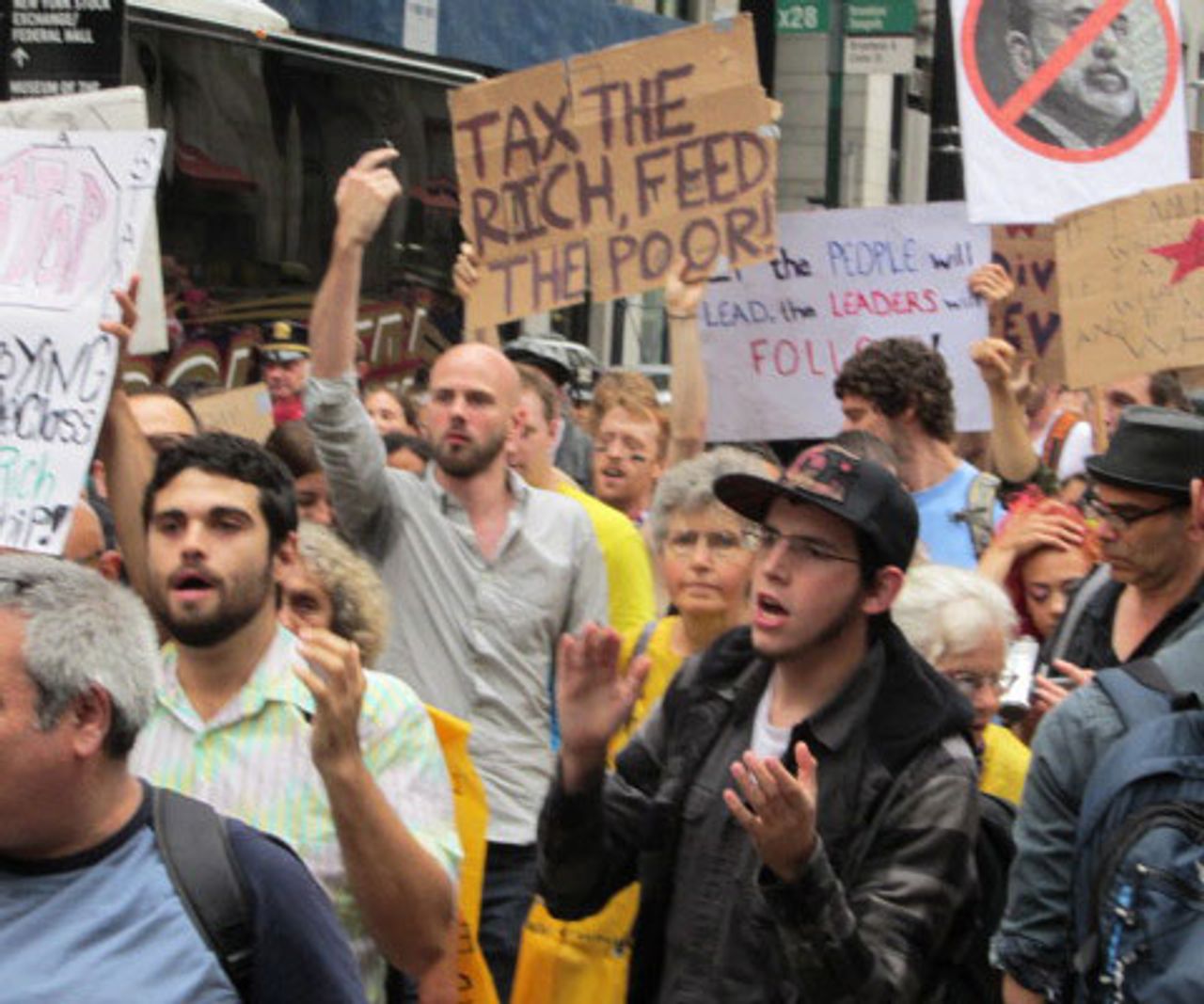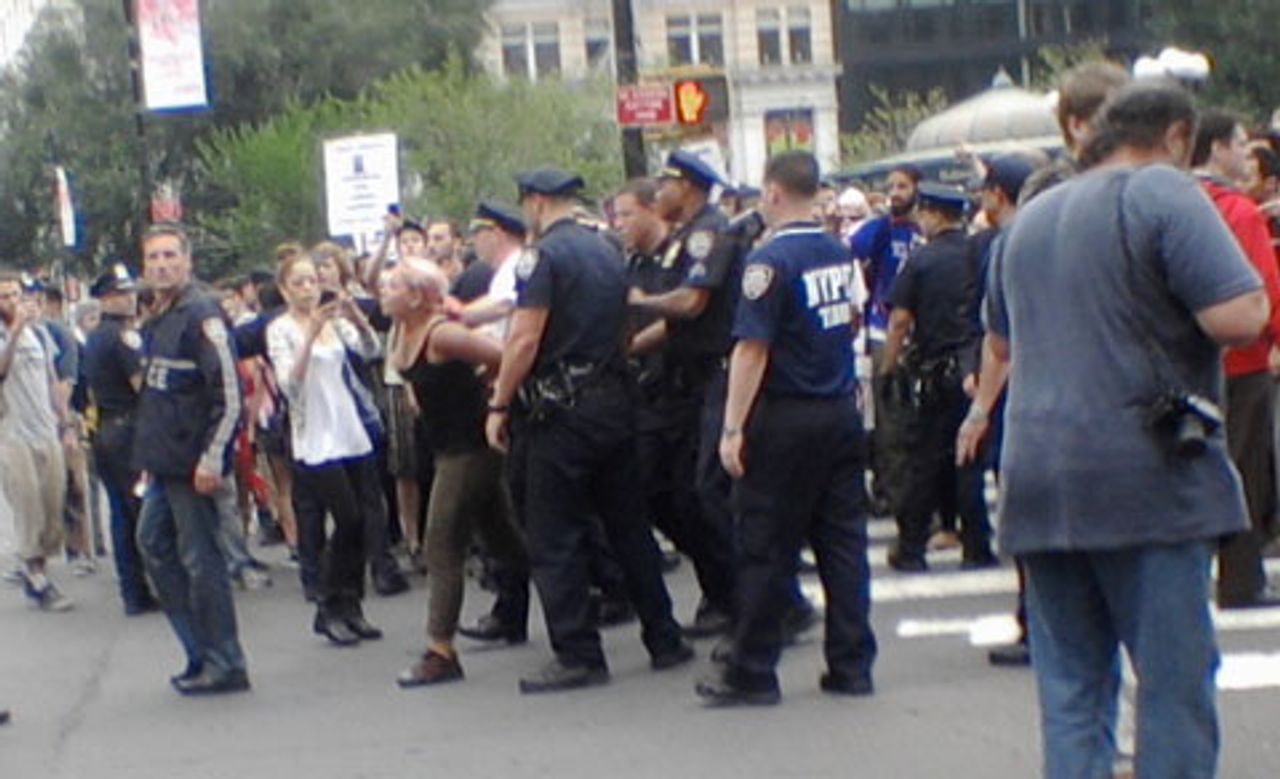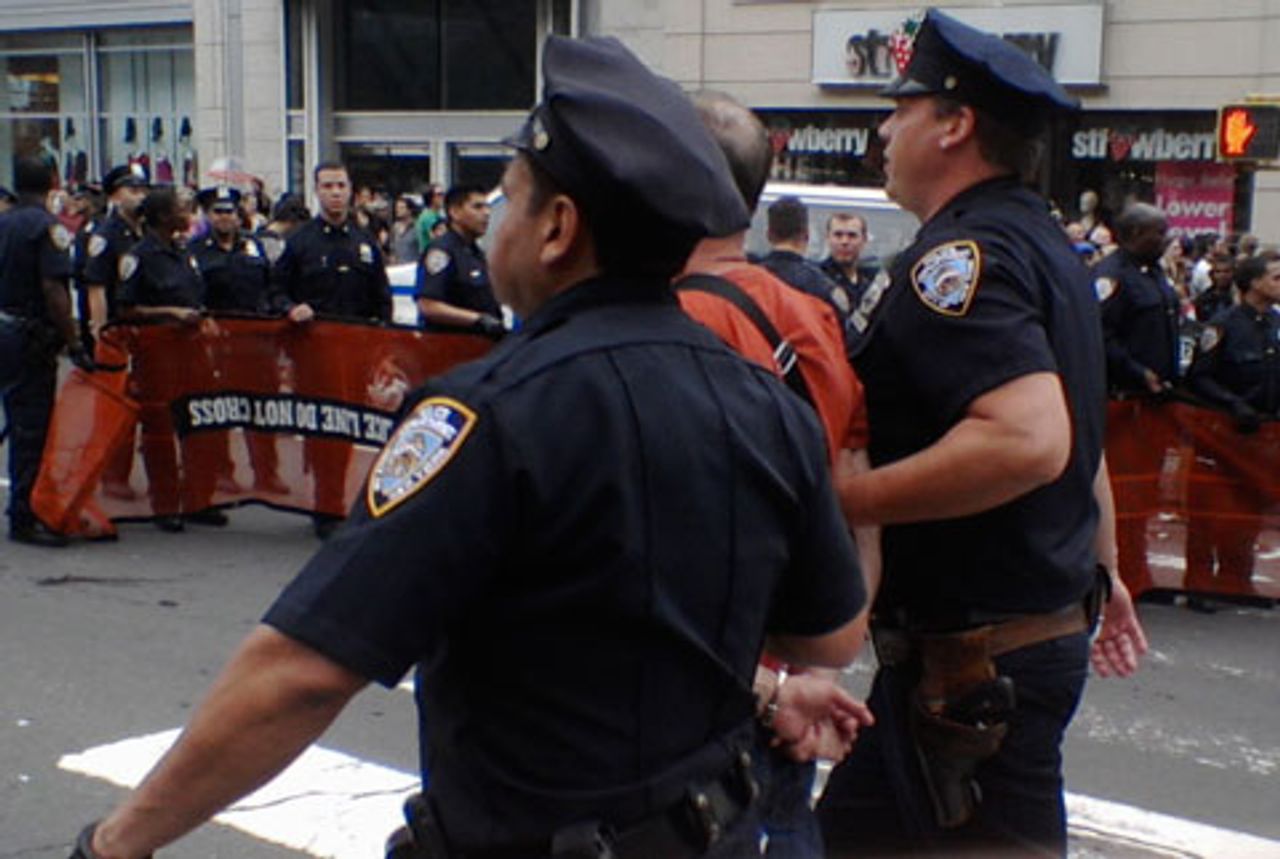 Part of the Wall Street protest
Part of the Wall Street protestOn Saturday afternoon, the New York Police Department (NYPD) arrested over 80 peaceful protesters at an anti-Wall Street protest near Union Square in lower Manhattan.
This marks a major escalation of police violence against the protesters who have occupied Zuccotti Plaza across the street from Wall Street since September 17. The protesters have renamed it Liberty Plaza after Tahrir Square in Cairo.
Over a thousand people marched north from the plaza to Union Square where police kettled them with orange nets and arrested over 85 people, the majority without provocation, and including some who were simply watching the protest. The police used unnecessary force and pepper-sprayed several demonstrators.
 Police making an arrest
Police making an arrestAccording to the organizers of the protest, some 60 people were herded into waiting buses and charged with disorderly conduct. Another 15 or so were crowded into a paddy wagon. The police denied protesters’ requests for medical attention. The World Socialist Web Site observed numerous high-ranking police officials, including New York’s police commissioner, Ray Kelly, near Union Square as the arrests were being made.
Later Saturday evening, hundreds of police and over 40 police vans surrounded Liberty Plaza, although no arrests ensued, and the encampment remains as of this writing.
Police harassment has been a feature of the protest since it began. Dozens of uniformed and plainclothes officers have surrounded the relatively small number of protesters who have been sleeping in the camp. Police vehicles frequently drive up with flashing lights.
 A protester being arrested
A protester being arrested Police have made forays on a daily basis to harass and arrest. The NYPD cited a forgotten 1845 law against masks worn in public to arrest protesters with kerchiefs around their faces on Wednesday. At other times, they have demanded that tarps used by the protesters as shelters be detached from trees. They have prohibited the use of bullhorns by the protesters.
The notorious NYPD TARU surveillance unit has been filming demonstrators on ongoing basis.
Now, however, as the mass arrests on Saturday and a ban on sleeping bags and camping equipment in Liberty Plaza on Sunday indicate, New York’s billionaire Mayor Michael Bloomberg and the financial elite of the city have decided to clamp down on the protest.
The occupation began on Saturday, September 17, when thousands of people, primarily youth, marched to Wall Street to protest the domination of the banks and corporations over economic and political life in the US. For the last week, dozens of protesters have spent the night in Liberty Square.
Supporters of the anti-consumerist journal AdBusters and of the web-activist group, Anonymous, initiated the occupation.
An editorial in AdBusters in July proposed the occupation, when it called for an action modeled on the occupation of Tahrir Square in Cairo and the protest by the indignados in Spain.
The purpose of the occupation, the statement said, was to “demand that Barack Obama ordain a Presidential Commission tasked with ending the influence money has over our representatives in Washington.”
On a video distributed in the weeks leading up the occupation, Anonymous called for a nonviolent occupation. The organization said that it had one simple demand: “We want freedom … the abuse of corporations and banks and governments ends here.”
The organizers of the occupation have made a point of rejecting “politics”, which essentially provides a cover for a perspective that is clearly one of reforming the capitalist system though protest. While the official web site of the occupation has called on workers to strike and occupy workplaces, nothing can be found in their leaflets or their online materials that is critical of the corporate-controlled Democratic Party or the central role that Obama Administration has played in the transfer of trillions of dollars to the banks and in massive budget cuts to social programs.
The corporate media have largely blacked out news of the protest, and have often adopted a tone of mockery when they have taken notice.
New York City is gripped by social tensions. While it is home to dozens of billionaires and thousands of multi-millionaires, the masses of the population live with declining wages, joblessness and poverty.
The city’s official unemployment rate is 8.7 percent, but the real number of those who have dropped out of the labor market or are working part-time on an involuntary basis is more than double that.
The unemployment rate among minority youth ranges from 25 to 30 percent, with African-American men between the ages of 16 and 24 having a nearly 75 percent jobless rate. Statistics released last week show that over 20 percent of the city’s population lives in what the federal government defines as poverty.
Mayor Bloomberg in a September 16 radio interview referred to the intensifying social crisis and warned: “You have a lot of kids graduating college can’t find jobs. That’s what happened in Cairo. That’s what happened in Madrid. You don’t want those kinds of riots here.”
It is no wonder that under these conditions, thousands of people during the week have stopped by the encampment at various times to show their support to the protesters or to learn more about what is happening. Added to this are many tourists from around the world who have shown great sympathy to the protesters.
A number of younger people have joined the protest, often their first, some of them traveling from other parts of the East Coast and the Midwest.
Joel and Jenny traveled from Columbus, Ohio to join the occupation. Joel said, “I came here to support the fall of capitalism and show my solidarity with other people who are in this struggle. A large section of the world’s resources are under the control of a few people. “ When asked about the role of the Obama administration, “Obama is the biggest compromiser, he has given up on everything that he promised.”
Channing from Brooklyn told us that she had recently graduated from college with over $70,000 in student debt and had accumulated $16,000 in medical debt. “Where is the hope?” she asked.
Adam, from Nassau County in Long Island, New York told us, “This is the first mass demo that I felt compelled to participate in. I came here to show my solidarity. I believe in what this agenda is about, but we need a critical number of people here to make it happen.” When we asked him what should happen, Adam said, “ We need wealth distribution in this country. We need higher tax rates for the rich.”
Of the many young people who came to the protest as sympathetic observers on Saturday, we spoke to a group of friends who gather weekly to discuss what needs to be done to change the political and economic conditions of the US. We asked Derek if he was a part of the protests. “Not yet,” he answered. “I agree with a lot of the message here. There is something wrong with the way that our culture represents the economic system. Something needs to be done, but I’m not sure what it is.”
Another member of the group, Mohammed added, “I wanted to check this out. I believe that there is something fundamentally wrong with society. Mohammed said that he was unemployed and had been surviving for the last few years on casual labor. We do need to protest,” he said. “Maybe we need to boycott the good of the corporations.”
When we asked him about the role of Obama and Democrats, Derek told us, “He’s been very disappointing, a real failure with his imperative.”
Sam Prendergast, a student who came from Australia to attend school in Virginia, spoke to the WSWS about why she was part of the encampment. “I am here at Wall Street because I have come to America, and I’ve seen too much injustice and inequality not to come down here. For me the camping out and demonstrations stand for the potential of change. I’m not a big fan of Obama or the Democrats or Republicans in the US.”
She carried a sign that read “Workers’ Rights = Human Rights,” and explained, “This means workers’ rights should be prioritized. A society without wage equality is a deeply unjust society. The working class has the numbers around the world to make a change.”
Another young woman who had joined the protest was Jessica Molina, an unemployed student who attends Medgar Evers College in the CUNY system in Brooklyn. “I came here Monday and Tuesday, and then came back on Thursday and have been camping out here since,” she said. “I do believe corporate America is corrupt, and that we do need to maintain and express our civil rights and liberties.
“Obama was supposed to bring the change we want to see. Now we are in Libya for reasons I have no idea about. What I am against in the wars like Libya is that they are killing people. I’m against the US and NATO bombings in Libya. There is nothing ‘humanitarian’ about bombing a nation. I think after 9/11 there may have been some war sentiment, but not now. It is also a big financial drain.
“Obama was elected for change and to bring the troops home. He has done neither. I can’t blame it all on Obama, but things are worse. The working people, who are lucky enough to have a job, are mostly working for minimum wages. Corporate CEOs go home after one day with more salary than most Americans make in a year. Then they want to take everything away from the employees like at Verizon.
“I have been looking for a job for over a year. At the end of last year, I found it was impossible to get a job so I decided to go back to school. I have medical and culinary job experience. I have worked at office temp jobs. There is a lot more job experience that I have, and I have looked everywhere. I get one response back from every 50 to 75 resumes I send out. And those replies don’t usually end up with an interview. There are more questions asked, more qualifications required, and you don’t even end up with an interview.
“I get tuition assistance, but I still have to take out bank loans to meet my living expenses. I have to live with my sister to control my living expenses. I don’t like the cuts in education. Education should be free like it is in other countries, because it is necessary for society to have a future.”
The author also recommends:
What way forward for Spain’s “angry ones”?
[27 May 2011]
